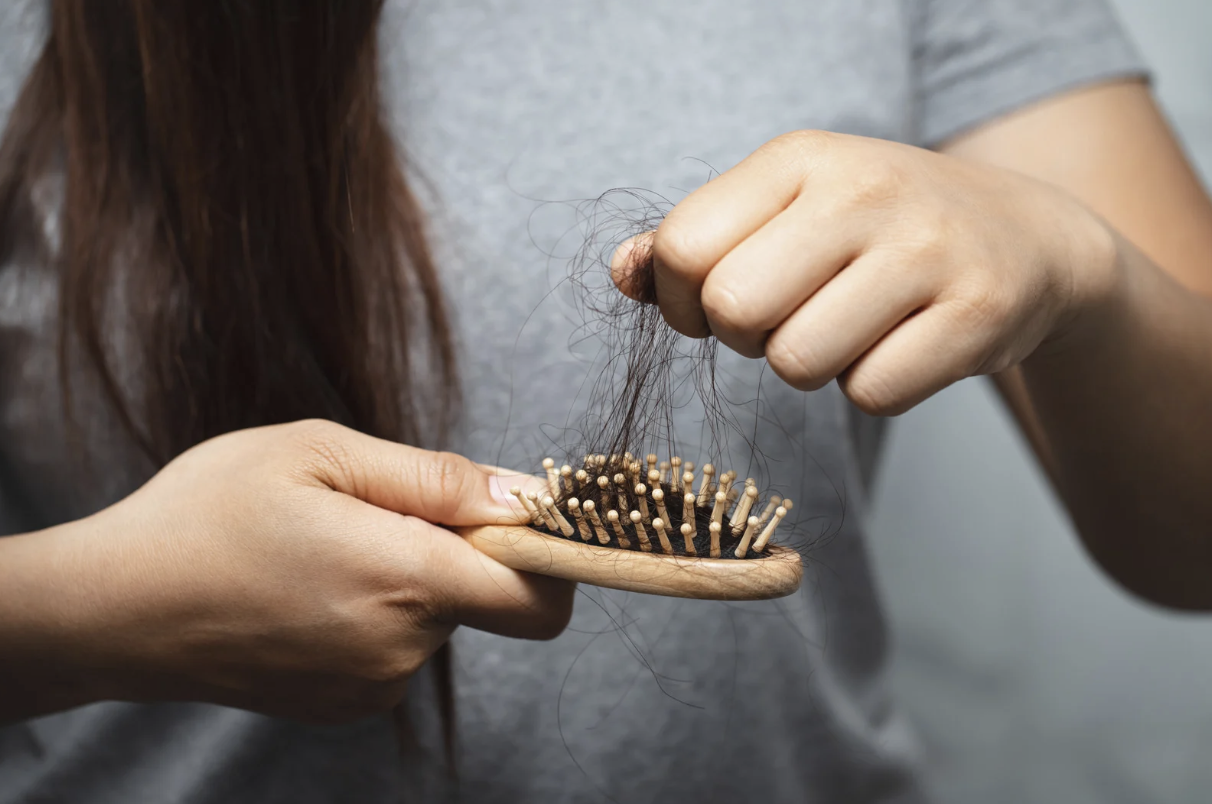
Perimenopause Symptoms: The Subtle Signs Most Women Miss (and Why They Matter)
Many women don’t realize perimenopause symptoms start with subtle changes—low energy, sleep issues, mood shifts, and weight gain. Learn what’s happening in your body and how to support your hormones naturally.

Perimenopause and the Winter Blues: Is It Hormones or Seasonal Affective Disorder?
When you’re in perimenopause, January can feel especially heavy. If you’re feeling low, irritable, exhausted, or emotionally flat right now, you might be wondering:Is this just winter? Or is something else going on? For women in perimenopause, the answer is often both. Hormonal changes can amplify the effects of winter in a way that feels confusing—and sometimes discouraging—especially when you’re already doing “all the right things.”

Sugar, Stress, and Hot Flashes: Surviving the Holidays in Perimenopause
The holidays are magical… and a little bit chaotic. Between holiday parties, endless to-do lists, family gatherings, and the steady stream of cookies and cocktails, it’s no wonder your hormones might feel completely off by mid-December. If you’ve noticed your hot flashes are flaring, your sleep is a mess, or your mood feels like a roller coaster this time of year — you’re not alone. The combination of sugar, stress, and disrupted routines can wreak havoc on your hormones during perimenopause. But with a little awareness (and some smart swaps), you can enjoy the season and keep your body feeling steady.

Let’s Talk About It: Genitourinary Syndrome of Menopause (GSM)
If you’ve noticed changes in your vaginal, sexual, or urinary health over the past few years, you are so not alone. In fact, nearly 84% of women experience symptoms in this area during or after perimenopause. Yet very few ever bring it up with their doctor. We’re taught to power through things like dryness, irritation, or leaks, and to laugh off the “I peed when I sneezed” moments. But these symptoms are not just “part of getting older.” They’re part of a very real—and very treatable—condition called Genitourinary Syndrome of Menopause (GSM).

Why Your Perimenopause Joints Hurt More When the Weather Turns Cold
The chill hits, and suddenly your body feels older than it is. Knees ache climbing stairs, your back twinges when you bend, and that deep stiffness in your hips seems to set in faster than it used to. As estrogen declines during perimenopause, the shift doesn’t just affect mood, sleep, or hot flashes. It can show up as inflammation and stiffness in the joints, and when colder weather rolls in, those symptoms often turn up the volume.

What Your Cycle Is Trying to Tell You in Perimenopause
If your once-predictable period has turned into a complete mystery, you’re not alone. One month it’s early, the next it’s late. Some cycles come with heavy bleeding and clots, others barely show up. You might skip one entirely—only for it to come roaring back with a vengeance. But here’s the thing: your changing cycle is one of the clearest signs that perimenopause has begun. And once you understand what your body is trying to tell you, those changes start to make a lot more sense.

The Hidden Toxins Making Perimenopause Harder
When you hear the word "detox," it might bring to mind juice cleanses, expensive powders, or something that feels a little too "crunchy" to take seriously. But detoxing in the real sense isn't about celery juice—it's about lightening the chemical load your body carries every single day. And during perimenopause, that load can hit harder.

Inflammation in Perimenopause: Why It Happens and What to Do About It
If you’ve noticed more bloating, puffiness, or random aches and pains lately, you’re not imagining it. Inflammation often ramps up during perimenopause—and it can make everything from joint pain to brain fog feel worse.

Perimenopause and Joint Pain: Why It Happens and What Helps
Joint pain is one of the most common symptoms of perimenopause—yet it’s rarely discussed in the same way hot flashes or night sweats are. Research shows that between 51–70% of women in the menopause transition experience joint pain, stiffness, or backache, and for about one in four, it can be severe enough to disrupt daily life.

What Your Doctor Isn’t Telling You About Perimenopause
If you’ve ever left a doctor’s office feeling dismissed, told “it’s just stress” or “you’re too young for menopause,” you’re not alone. For too many women, getting honest answers about perimenopause feels like pulling teeth. The reality? Most doctors are not thoroughly trained in menopause care. In fact, a 2019 survey found that fewer than 20% of U.S. OB-GYN residency programs offer any education on menopause at all. That means you could be sitting across from a well-meaning provider who has never received in-depth training on the very symptoms disrupting your life.

The 3 Nutrition Habits That Made the Biggest Difference in My 40s
These 3 simple nutrition habits for perimenopausal women over 40 boosted my energy, balanced my hormones, and helped me feel like myself again. Try them today!

How Perimenopause Affects Gut Health, Hormones, and the Estrobolome
If you're bloated, gassy, constipated, breaking out, gaining weight, or feeling more fatigued than usual, it might not just be your digestion acting up. It could be your hormones. More specifically, it could be your gut and hormones, intertwined in a way that no one has warned us about. The gut and your hormones are in constant conversation—and when that conversation goes sideways, so do your symptoms.

Perimenopause in the Summer: How to Beat the Heat
If you're in perimenopause and sweating your way through a brutal summer—you’re not imagining it: the heat can make your symptoms worse. Hormonal shifts during perimenopause affect everything from how your body regulates temperature to how well you sleep and manage stress. When you add 90+ degree days and sticky humidity, even the most manageable symptoms can become overwhelming.

You’re Not Lazy—You’re in Perimenopause
If you’ve ever wondered why your energy has flatlined, your motivation is inconsistent, or your ability to focus has taken a nosedive, you’re not alone. Many women in their 40s and early 50s suddenly find themselves feeling off, frustrated, and wondering what happened to their old selves. The truth is, you're not lazy. You're in perimenopause. This transitional phase leading up to menopause brings real changes—especially when it comes to energy, brain function, and stress resilience.

How Perimenopause Increases Anxiety and Depression
If you’ve found yourself more anxious, teary, irritable, or overwhelmed than ever before—and you’re in your late 30s or 40s—you’re not alone, and you’re not just “bad at coping.” For many women, these emotional changes are one of the first signs of perimenopause, even before their periods become irregular. And yet, this side of the perimenopause journey is still rarely talked about.

Is It Perimenopause or Something Else?
If you're in your 40s and starting to feel "off"—you might wonder: Is this perimenopause? Or is something else going on? It's a fair question; many women don't feel equipped to answer it. That's because perimenopause is notoriously tricky to diagnose. But here's the empowering truth: understanding what's normal during this phase of life—and what might need a second look—can help you feel informed, grounded, and in control of your health.

Why Am I Losing My Hair in Perimenopause?
Hair loss during perimenopause is incredibly common, but that doesn’t make it any less frustrating or emotional. For many women, it can feel like one more thing their body is doing without their permission. The good news? You’re not stuck with it forever. Once you understand why it’s happening and what your hair needs during this transition, there’s a lot you can do to support regrowth, slow shedding, and rebuild confidence—strand by strand.

Why Am I Always Hot? Understanding Hot Flashes, Night Sweats, and the Vasomotor Symptoms of Perimenopause
Most women are familiar with the term "hot flash," but many don't realize this is just one part of a broader picture. Vasomotor symptoms can also include night sweats, sudden feelings of anxiety, flushing, and even heart palpitations. These intense and often unpredictable moments are classic symptoms of vasomotor instability, a hallmark of perimenopause.

Why Blood Sugar Balance Is the Secret to Feeling Better in Perimenopause
If you're in perimenopause and feel like your body is working against you—think stubborn belly fat, mood swings, brain fog, and energy crashes—blood sugar might be the missing piece you haven't considered. When blood sugar rises, your body releases a hormone called insulin to help shuttle that sugar out of your blood and into your cells. When everything is working smoothly, your energy stays stable, your cravings are manageable, and your hormones stay more balanced. But when blood sugar is constantly spiking and crashing (from processed foods, skipping meals, stress, poor sleep), your body is continually stressed—and your hormones suffer.

Perimenopause and Sleep Issues: Why Midlife Sleep Feels Impossible
If you're like me, you probably have woken up drenched in sweat, gasping for breath, and staring at the ceiling. Welcome to the nightly battle many women face as their bodies struggle with perimenopause. Perimenopause typically occurs in your 40s (but can start in your 30s and last well into your 50s) and brings hormonal changes that can make sleep feel impossible. You're not alone if you've been tossing and turning, waking up multiple times a night, or struggling with daytime fatigue. Studies suggest up to 85% of women in perimenopause experience some form of sleep disturbance.